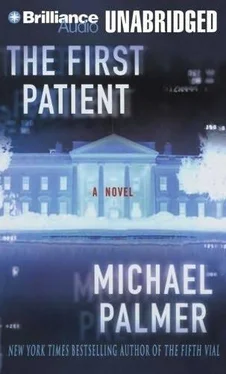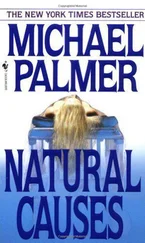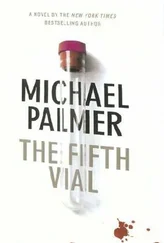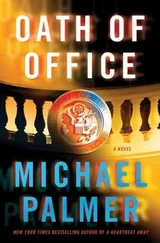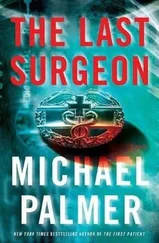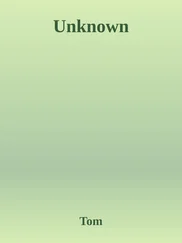Most of the science was more than Gabe wanted to or even could handle. But the potential of nanotechnology was as apparent as it was limitless, made possible in large measure by the chemical ability of carbon to bond with other atoms and by the invention of futuristic machines such as the scanning tunneling microscope and the transmission electron microscope, capable of actually visualizing nanotubes and fullerenes. Remarkable.
Already there were more than seven hundred commercially available products as varied as cosmetics, golf club shafts, and bullet-resistant shirts all built with nanomaterials. Nano toothpaste containing nanohydroxy apatite was able to bind to the protein in plaque, making it easier to loosen and remove, while at the same time it was filling scratches on dental surfaces. Nanosilver coatings on flatware, doorknobs, wound dressings, water faucets, makeup implements, and socks impeded or eliminated bacterial growth. The list and variety of products were stunning.
This was not the science fiction of gray goo. This was the real deal, making its way into the fabric of society on an incredible number of fronts and with a speed that had to be astounding even to those brilliant and visionary Nobel laureates who originally created the field.
Somewhere around one in the morning, Gabe had fallen asleep on his notes. At one thirty, still seated, facedown at the table, he was awakened by the ringing telephone.
"Dr. Singleton?"
"Yes."
"Sorry to call you at such an hour, sir. This is McCabe at security downstairs. There's an envelope for you that was just dropped off here by a messenger. It says to deliver it to you immediately. Would you like me to send it up?"
Gabe pawed at his eyes and combed his hair with his fingers.
"No, no. I'll be right down. A messenger?"
"Yes, sir. None of us caught what company he was with, and there's no indication on the envelope. Just the instructions to deliver it to you immediately."
"I'll be there in a minute."
The headache, a familiar electric pain behind his eyes, seemed to have woken up when he did. Before he had even fully processed his action, he had opened his bureau drawer and taken out the plastic vial of codeine and other pills.
"I never took a pill that I didn't have a pain for."
The notion stopped him short. From the moment his former roommate had stepped out of Marine One at the ranch, Gabe's rather straightforward, comfortable, and uncomplicated life had been transformed to one enmeshed in half-truths and outright lies. Now, according to Kyle Blackthorn at least, it appeared that Drew's withholding the fact of his mental illness was not his only deception. Whether the psychologist's shingan sense was right or not, time would hopefully tell.
It was becoming increasingly clear to Gabe that there was little he could do about those around him except trust none of them. There was, though, something he could do about the deception he had been working on himself. There were thousands in AA recovery, maybe tens of thousands, who managed to deal with routine headaches without leaping for a mind-altering painkiller.
For years, the fallout from the deaths at Fairhaven had been a smoldering depression that had cost him in many ways, including his marriage. He had tried to overcome the feelings by starting Lariat and by going on medical missions to Central America, and he had successfully sworn off booze. But the reliance, if not dependence, on pills was a constant reminder that the depression was always lurking and never very far below the surface.
He flipped the vial back into the drawer and washed down some Extra Strength Tylenol instead. For the time being, the motion to give up on the pills had been tabled. But at least he could watch himself more carefully. As the twelve-step book so eloquently stated, recovery was a matter of progress, not perfection.
The five-by-seven manila envelope was completely unadorned except for DR. GABE SINGLETON, neatly block printed in black ink, and the instructions that the envelope was to be delivered immediately, printed in the same way beneath it. Curious more than apprehensive, Gabe questioned the man who had accepted the delivery and assured himself that he had no information that would be of any help. Then Gabe brought the envelope back to the condo and opened it on the table.
We must meet.
Tell no one.
Come alone.
Go to the office we both have occupied.
The meeting time is to be exactly twenty-four hours from now.
In the office there are four framed photos taken by me. Examine the third photo from the right. I will meet you beneath that structure.
The nightmare must end.
J.F.
Donald Greenfield.
With each passing hour, thanks largely to the Internet and courses on its use that she had taken during her training, Alison grew to know more and more about the man.
Donald Greenfield, owner of a one-year-old Porsche 911, Virginia registration number DG911, garaged on Lido Court in Fredericksburg. Apparently paid for.
Donald Greenfield, owner of the forty-one-hundred-square-foot Victorian house at 317 Beechtree Road, Richmond. Purchased ten years ago for $321,000 and recently assessed at $591,000. Refinanced five years ago. Shared with at least one beautiful Mexican woman, Constanza, and one stunning Mexican girl, Beatriz. Previous residence, 14 Collins Avenue, Salina, Kansas; home owner there for fourteen years.
Donald Greenfield, occupation: self-employed; Social Security number 013-32-0875; mortgage $2,139.00 a month; no other mortgages; no credit card debt; no dependent ex-wives, no children; no criminal record. Checking account-Bank of America, Richmond. Credit rating 650. ( Why so low? she wrote beside the number.)
Alison flipped through her notes, both pleased and dismayed with the results of her first day of investigation. She wondered in passing who Donald Greenfield had been before Treat Griswold appropriated his name and identity. Of all the hundreds-probably thousands-of federal agencies, there was still none coordinating births and deaths. Griswold had probably searched the cemeteries for an infant or child who had been born around the same year as had he. For a person with his understanding of the workings of the federal government, obtaining a Social Security number in the dead child's name would have been easy, and from there fleshing out an identity would have been even easier still.
Questions remaining to be answered included where Griswold was getting the money to support his double life and whether there was any connection between what she had uncovered about him and his practice of toting around an inhaler used regularly by the president.
Another gnawing question needing resolution soon was when she was going to share the burden of what she was learning and with whom. That was the most perplexing question of all.
It was after one in the morning. Her jaws ached from hours of vigorous gum chewing. The tension of the day had left her more wired than tired, but a glass of Merlot was usually all that was needed to nudge her toward sleep. She uncorked a new bottle-medium priced with a label she liked, from a California vineyard she had never heard of. She poured one glass, drank it slowly, then decided on a second, which she dispatched quite a bit quicker.
St. Boniface's Winery. Good label, good stuff.
She wrote down the name and terse evaluation in the small spiral notebook she always carried in her purse. No need to specify Merlot. It was rare that she drank at all and, as she was a creature of habit, even rarer that she ventured to another grape.
"Griswold… Griswold… Griswold," she murmured, settling back in her desk chair. "What's with you, Griswold? Are you really into what I think you're into?"
Читать дальше
